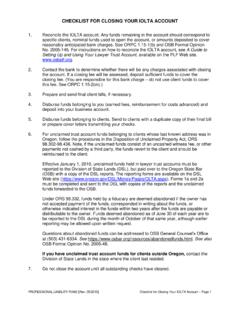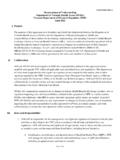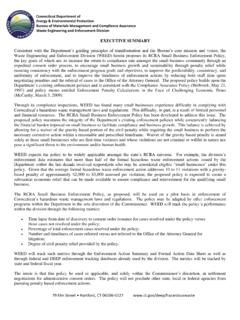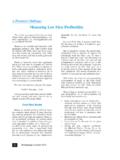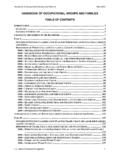Transcription of 2017 LEGISLATION ALERTS Employment and Labor …
1 ISSUE 133 | JANUARY 20181 LAW UPDATES2017 LEGISLATION ALERTSE mployment and Labor LawHB 2005 (Ch. 197) Pay Equity LawHB 2005 expands the protections of equal pay found in ORS HB 2005 will explicitly prohibit employers from paying people less based not only on gender, but also on race, color, religion, sexual orientation, national origin, marital status, disability, or age. However, pay disparities can exist when there is a bona fide reason for such a disparity. These bona fide reasons include seniority, merit, production-related metrics, workplace locations, travel needs, education, training, or experience. HB 2005 provides a safe harbor for employers who have conducted a pay analysis within three years of any lawsuit, and can show a reasonable effort based on that analysis to eliminate wage disparities that violate HB 2005.
2 Employers who trigger the safe harbor provision are able to file a motion to disallow an award of compensatory and punitive damages. However, employers are prohibited from cutting other workers pay in order to even out the compensation levels. HB 2005 also bars employers from using salary history when determining new workers pay. Thus, job applications that ask for prior salary history are now prohibited by law. Although a majority of HB 2005 goes into effect on January 1, 2019, the prohibition on inquiring into salary history went into effect on October 6, 3008 (Ch. 211) False Employment RecordsHB 3008 prohibits employers from compelling, coercing, or otherwise inducing or attempting to induce an employee to create, file, or sign documents that the employer knows are false in regards to hours worked or compensation received.
3 It provides a private cause of action for falsifying these time cards, and allows for either an award of actual damages or $1,000 for each violation, including attorney fees and costs. HB 3008 takes effect on January 1, 3458 (Ch. 685) Manufacturing Employers Overtime HB 3458 amends ORS and to clarify an issue regarding how manufacturing employers calculate overtime. The bill essentially rejects the Oregon Bureau of Labor and Industries (BOLI s) interpretation concerning overtime entitlements. The new law requires manufacturing employers who owe daily and weekly overtime to calculate the two amounts and then pay out the greater of the two to their law also caps weekly manufacturing hours at 55, although employees can voluntarily request or agree to up to five more hours as a permissible overage (more for manufacturers dealing with perishable products and who have an undue hardship notice approved by BOLI).
4 Employees claiming they were required or coerced to inBRIEF | Malpractice Prevention Education for Oregon Lawyers | 2work beyond 13 hours in a day, or 55 hours in a week, may recover $3,000 for each violation, plus liquidated damages equal to twice the employee s overtime wages earned during the period of non-compliance. Although HB 3458 took effect on August 8, 2017 , the portion of the law regarding the new private right of action becomes effective January 1, 299 (Ch. 520) Sick Leave AccrualSB 299 amends ORS to expressly permit an accrual cap on sick leave. Starting January 1, 2018, employers can limit the accrual of both paid and unpaid sick time to 40 hours per year. As originally written, the law specifically allowed employers to limit the amount of carryover of sick hours from one year to the next, but it was unclear whether an employer could limit sick time accrual within a single year.
5 Now, the legislature has clarified that employees can have a maximum sick leave bank of 80 hours, but only if they have 40 hours from a prior year and 40 hours from the current 299 took effect on August 8, 398 (Ch. 333) Earned Income Tax CreditSB 398 requires employers to provide employees written notice that they are able to receive both federal and state earned income tax credits. The notice must:1. Be in English and in the language the employer uses when speaking with employees; 2. Be sent annually with the W-2 forms; and 3. Provide website addresses for the Internal Revenue Service and the Department of Revenue where the employee can find information about state and federal earned income tax bill also requires the Bureau of Labor and Industries to provide notice to employees on state minimum wage posters about the earned income tax credit.
6 The legislature enacted this law because over 75 percent of Oregonians who qualify for this credit do not claim it. SB 398 took effect in October 2017 . SB 416 (Ch. 334) Prevailing Rate of WageSB 416 modifies the prevailing wage rate for projects that are divided into multiple contracts. The new statutory language added to ORS essentially closes a loophole that enabled contractors to avoid prevailing wage rate laws. It now prohibits anyone not just public agencies from dividing public works projects into more than one contract in order to avoid prevailing wage rate laws. In addition, new statutory language added to ORS provides that disadvantaged business enterprises, minority-owned businesses, women-owned businesses, businesses owned by service-disabled veterans, and emerging small businesses must post bond if they fail to pay workers the prevailing wage rate.
7 Further, the bill amended ORS to establish that the failure to pay fringe benefits and the failure to pay the prevailing wage rate are separate violations. SB 416 took effect on June 14, 828 (Ch. 691) Predictive SchedulingSB 828 creates new obligations for certain employers (those retail, food service, and hospitality businesses with 500 or more employees worldwide) to post schedules seven days in advance. Enforcement of this provision does not begin until January 1, 2019. Beginning January 1, 2020, however, schedules must be posted 14 days in advance. Employers with collective bargaining agreements are not exempt from SB 828 s 828 also requires employers to provide employees with a written, good-faith estimate of the worker s schedule at the time of hire.
8 Employers are no longer allowed to schedule employees within 10 hours of their last shift. ISSUE 133 | JANUARY 20183If an employer needs to change the work schedule after the date that advance notice is required, the employer must meet several requirements to satisfy the new law and will likely have to pay a premium to the employee impacted by the change. Furthermore, an employer cannot require employees to work shifts that were not on their written work schedules. To alleviate some of the burden on employers, SB 828 allows for the creation of voluntary standby lists. This will help employers deal with unexpected absences or last-second changes to their work , the law includes a narrow private right of action against employers for retaliation.
9 As of January 1, 2019, employees may pursue private, civil causes of action for discrimination and retaliation claims under this law. The Bureau of Labor and Industries will also have the power to seek penalties for each violation. SB 828 took effect on August 8, 949 (Ch. 360) Home Care Workers Noncompetition AgreementsSB 949 makes noncompetition and non-solicitation agreements in Employment contracts for home care workers voidable by the worker. Further, SB 949 makes these agreements unenforceable in Oregon courts. SB 949 takes effect on January 1, 2018. SB 1040 (Ch. 369) Union Security AgreementsSB 1040 is a response to the decision in United Automobile Workers v. Hardin County (KY), 842 407, a recent decision by the Sixth Circuit Court of Appeals that appeared to recognize a right of some local governments to ban union security agreements.
10 This bill establishes a statewide policy permitting an employer or Labor organization in this state to have an agreement requiring membership in a Labor organization as a condition of Employment to the full extent allowed by federal 1040 took effect on June 14, 2017 .








